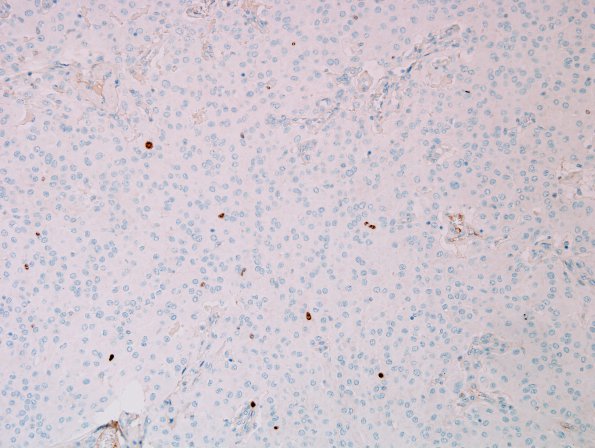Table of Contents
Washington University Experience | NEOPLASMS (MENINGIOMA) | Rhabdoid | 12D Meningioma, rhabdoid WHO ungraded (Case 12) Ki67 1.jpg
12D Ki67 immunoreactivity is minimal ---- Ancillary data (not shown): Staining for progesterone receptor is negative. ---- FISH results. Deletions of chromosomal arms (22q, 14q, 1p, and 9p) are associated with meningioma. In particular, 1p, 14q, and 9p deletions have been associated with atypical and anaplastic meningiomas, as well as those meningiomas bearing a higher risk of recurrence and shorter progression free survival. In this particular case, there is deletion for 22q and monosomy for chromosome 9. Normal dosages (i.e., two copies) of chromosome 1 are seen. FISH analysis of chromosome 14 is non-informative. These FISH results are in keeping with the diagnosis of a meningioma. Moreover, the finding of monosomy for chromosome 9 suggests the presence of a potentially more aggressive meningioma and fits with the worrisome rhabdoid cytology seen in this case. ---- Comment: By strict WHO criteria in place at the time (2007) the diagnosis of rhabdoid meningioma seen in this case was graded as anaplastic (i.e., WHO Grade 3). A note was included that “While the majority of rhabdoid meningiomas bear malignant features, occasional cases, like this current case, do not. However, these latter cases are rare and too few have long-term clinical follow-up. As such, it is difficult to definitively grade this neoplasm, although the rhabdoid morphology and chromosome 9 monosomy are concerning features. Close clinical follow-up is recommended.”

